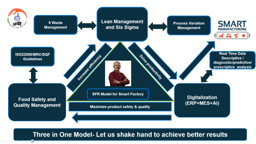Digitalization in manufacturing and training

Throughout my research on the internet, I came across several impactful quotes regarding training and its significance. Here are a few noteworthy ones:
"An employer once said, 'What if I train my people and they leave?' I say, 'What if you do not train them... and they stay...'" -- Evan Kirshenbaum.
"The only thing worse than training your employees and having them leave is not training them and having them stay."
Ignoring the training and development of your employees can lead to decreased productivity, higher turnover rates, and a negative impact on morale.
“If you believe training is expensive, it is because you do not know what ignorance costs. Companies that have the loyalty of their employees invest heavily in permanent training programs and promotion systems”.
The manufacturing industry is actively undergoing a significant digital transformation through MES, and ERP systems, as companies of all sizes endeavour to leverage IT-based systems encompassing applications, hardware, and data management. This industry is poised for substantial growth, with a projected surge from $31.68 billion in 2021 to a remarkable $83.5 billion by 2030, and the integration of AI, robots, sensors, and data management tools drives it.
In the thorough project planning for MES / ERP implementation, it is essential to acknowledge the often overlooked yet pivotal aspect of human resource development through comprehensive training and awareness programs. Synchronizing the pace of digitalization with workforce development is imperative, necessitating well-designed training and awareness initiatives. The oversight of either training (how to perform a job) or awareness (why the job is essential) can lead to post-implementation challenges, including diminished job satisfaction, operational errors, and in extreme cases, system failures. Investing in employee training is a non-negotiable requisite for successful implementation and achieving desired objectives. A well-crafted training budget ensures that employees maintain high skill levels, stay motivated, and continue to drive productivity. While specific training budget allocation may vary based on unique business requirements, designating 2-2.5% of the IT project budget to employee training is widely deemed standard. However, situations where individuals possess limited IT knowledge or where substantial alterations to the existing system are introduced may necessitate a higher budget allocation. The transition from a paper-based to an IT-based or digital data system represents a monumental shift that calls for deliberate and justified investment in training initiatives. Guidance is available if requested.
Guidance is available if requested.
Syed Farhat Raza



Please sign in or register for FREE
If you are a registered user on The FSQ Network, please sign in